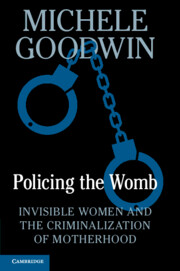Book contents
- Policing the Womb
- Policing the Womb
- Copyright page
- Dedication
- Contents
- Preface
- Acknowledgments
- 1 Introduction
- 2 Pregnancy and State Power
- 3 Creeping Criminalization of Pregnancy across the United States
- 4 Abortion Law
- 5 Changing Roles of Doctors and Nurses: Hospital Snitches and Police Informants
- 6 Revisiting the Fiduciary Relationship
- 7 Creating Criminals: Race, Stereotypes, and Collateral Damage
- 8 The Pregnancy Penalty: When the State Gets It Wrong
- 9 Policing Beyond the Border
- 10 Lessons for Law and Society: A Reproductive Justice New Deal or Bill of Rights
- 11 Conclusion
- Epilogue
- Notes
- Select Bibliography
- Index
10 - Lessons for Law and Society: A Reproductive Justice New Deal or Bill of Rights
Published online by Cambridge University Press: 07 February 2020
- Policing the Womb
- Policing the Womb
- Copyright page
- Dedication
- Contents
- Preface
- Acknowledgments
- 1 Introduction
- 2 Pregnancy and State Power
- 3 Creeping Criminalization of Pregnancy across the United States
- 4 Abortion Law
- 5 Changing Roles of Doctors and Nurses: Hospital Snitches and Police Informants
- 6 Revisiting the Fiduciary Relationship
- 7 Creating Criminals: Race, Stereotypes, and Collateral Damage
- 8 The Pregnancy Penalty: When the State Gets It Wrong
- 9 Policing Beyond the Border
- 10 Lessons for Law and Society: A Reproductive Justice New Deal or Bill of Rights
- 11 Conclusion
- Epilogue
- Notes
- Select Bibliography
- Index
Summary
In this Chapter, I consider what lessons can be learned and pathways forward. The reproductive battleground was once in the courts, where incremental advancements through landmark decisions were achieved. Skinner v. Oklahoma (overturning a compulsory sterilization law that treated similar crimes differently), Griswold v. Connecticut (overturning a Connecticut law that barred married couples from accessing contraceptives), Eisenstadt v. Baird (striking down a Massachusetts law that restricted non-married persons from accessing contraceptives), and Roe v. Wade (decriminalizing doctors’ performing abortions) formed the foundation for the reproductive rights discourse, advancing concepts such as privacy and autonomy in the reproductive health space. However, recent retreats from the primacy of those holdings by the Supreme Court suggest that, at least for the present time, the Court may gerrymander reproductive rights and weaponize the First Amendment to advance the personal views of five conservative male Justices of the Court. Drawing on brilliant contributions of scholars, civil society, activists, a bold new cohort of female legislators at the state and federal levels, and intuitions of judges committed to the equality of women, this Chapter concludes that a Reproductive Justice Bill of Rights is needed and that new pathways in litigation must involve an equal protection analysis.
- Type
- Chapter
- Information
- Policing the WombInvisible Women and the Criminalization of Motherhood, pp. 164 - 190Publisher: Cambridge University PressPrint publication year: 2020

